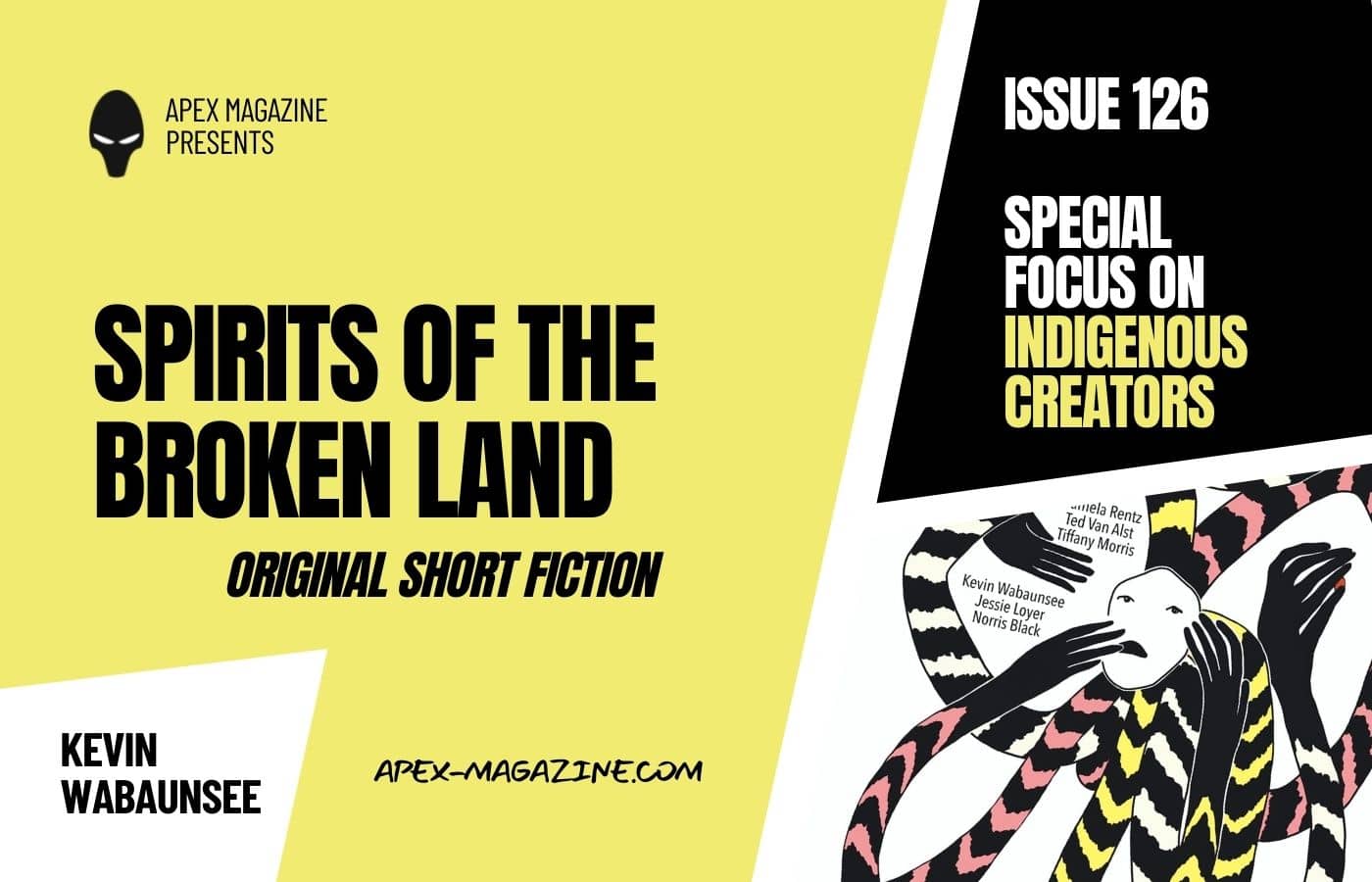
Kevin Wabaunsee’s “Spirits of the Broken Lands” perfectly captures that sense of constrained rage, the burning injustice of being forced to comply with ignorance and vapid, hungry materialism at the cost of lives, cultures and collective histories, while not being able to show a hint of natural human reaction to it.
From the opening paragraph, “Spirits of the Broken Lands” throws the reader into the house of cards literally built on the ashes of the Shawdese Indigenous people. The Thersian colonizers have not only claimed the land as theirs and actively erased anything that speaks to its true history, but also anything that makes them remotely uncomfortable about their role as oppressors. They recognize only the version of reality they have constructed and rewritten to suit themselves, a counterfeit history maintained through voluntary ignorance and broad-spectrum violence.
The story explores how one Shawdese man, Gwisen, survives within this faux reality by both playing into the colonizers false narratives and pushing back in subtle and clever ways. But surviving in this world also means compartmentalizing and containing his rage, never letting it be seen for fear of punishment. This creates an agonizing tension for the reader, one that the main character feels throughout his entire life.
This well-crafted and ominous build up meant that we readers felt the full cathartic release in the end when Gwisen finally releases his long-simmering rage in an explosion of revenge and destruction. And it is only in this release that Gwisen is finally able to fully connect with the collective memories and spirits of his people. It’s a very visual and spectacular ending, full of an energy that ripples out beyond the page.
Kevin Wabaunsee is a Chicagoan, a Prairie Band Potawatomi, and a speculative fiction writer. He’s a science writer and editor and a former newspaper reporter. He is a graduate of the Viable Paradise workshop, one of the associate editors at Escape Pod, and currently serves as the managing editor for the Science Fiction and Fantasy Writers of America (SFWA).
APEX MAGAZINE: The parallels from this story to our world are tragically clear, but can you tell us what first inspired you to tell this particular story about Gwisen? Did it start with the character or idea?
KEVIN WABAUNSEE: The inspiration for this story came several years ago with an idea that I’d been mulling over: what if magic is more than just spells and energy? What if magic is the expression of a worldview, not just imposing will on reality? That’s a pretty esoteric idea, so I soon latched onto a simple situation to play with: a magic-using busker and an imperious magician who literally can’t believe what he’s seeing.
Still, the story never evolved past that image and those unformed ideas, and I set it aside for a long time. It wasn’t until I returned to it and considered more seriously what worldviews were being expressed, that things started to make more sense. The missing pieces that allowed this story to come together were the power dynamics between oppressor and oppressed and, in particular, the guilt and uncertainty of an Indigenous survivor who’s forced to navigate between both worlds.
AM: Gwisen is a master of using the gullibility and ignorance of the Thersians to scrape out a living and survive. He’s a skilled opportunist, always looking for a mark, trying to turn the tables and use the Thersian’s false narratives against them. Yet, in doing so, he’s forced to be complicit in maintaining these false narratives. What does this forced complicity do to a person?
KW: This push and pull between authenticity and expectation, and between complicity and survival, is at the core of Gwisen’s struggle. He has no real power in Thersian society except that small amount of satisfaction he can take from laughing at the market-goers’ gullibility. Still, parading around in a garish parody of his own culture to satisfy the whims of colonizers is impossibly painful, as well. Nonetheless, he still needs to find a way to survive in this world. This story explores that breaking point—how much of his own identity can Gwisen mortgage before the price becomes too much? A lifetime of deference, of anger suppressed and rage stifled, is bound to come out, with explosive consequences.
AM: There is a heart-wrenching moment in the story when Gwisen reaches out to the guardian spirits of his people and sees one who is completely unfamiliar to him. The stories and collective memories of his own people have been stolen from him, rendering his own spiritual guardians as strangers. Did you have this moment in mind when you started writing the story or was this something that emerged along the way?
KW: Even in early drafts, before I’d settled on the world of the Shawdese and Thersians as the backdrop of this story, I’d considered the idea of having the main character summon a bigger and more destructive spirit in the climax of the story. Initially, I liked that it inverted the beginning of the story—a street performer with little real power begging for coins while summoning an insignificant spirit versus that same character unleashing a hugely destructive monster spirit. But without the emotional backdrop and stakes of a Shawdese refugee against a Thersian Empiricist, it felt hollow—all sound and fury, but not actually signifying anything important. Everything made a lot more sense in that scene once Gwisen’s fear and anger and his lifetime of stifled fury took center stage. That the power and destruction sprung forth from a heritage eradicated by Thersian colonizers was a happy accident—one of the moments of resonance that suggested I might be on the right track with this story.
AM: Aldeen Dinsmere, the Thersian Empiricist, considers himself a scientist, and yet he fails to see the truth of the spirits even when the evidence is literally destroying him. His pleas to know the trick behind the magic are cried out to his very last. Can you unpack that a little more? What interests you about the way scientists can be so blinded by their own biases?
KW: From the beginning, I wanted this story to explore the idea that magic isn’t just power and effects but the expression of a worldview. It’s not a coincidence that the Thersian sorcerers refer to themselves as “Empiricists”—to them, they’re not dealing with anything ineffable or truly supernatural, only a manipulation of energy and phenomena that can be predicted and directed. So, within this world, Dinsmere isn’t simply biased—he’s literally living in a different reality, one that up until now has always obeyed his command and fit neatly into his expectations. The utter disbelief that he experiences when confronted with Gwisen’s worldview can be pretty easily paralleled with the real-world shock and denial that many privileged people express when confronted with evidence of their own unearned power.
AM: You’ve written other excellent stories exploring magicians and artificially constructed realities (e.g. “The Great Mandini and the Dead Man’s Hand” in Strange Horizons and “The Happiest Place” in Pseudopod.) What is it that fascinates you about constructed realities and deception and have you always been drawn to these themes?
KW: Growing up, I navigated the boundary between different cultures, and not always comfortably: both as the only Native kid in mostly white surroundings, but also growing up in a biracial family. I often felt like blending into different social situations like a chameleon was a solid survival strategy. As a result, I think I have a greater-than-average interest in stories about transformation, metamorphosis, and disguise. And probably no coincidence that I’m also a sucker for stories about con men, sleight-of-hand artists, and tricksters of all sorts.
AM: Who are some of your creative inspirations and what makes them meaningful to you?
KW: I could begin and end with Octavia E. Butler, and probably not need to go further. I’m continually in awe of the way she dissected power and oppression but also so poignantly explored what it means to be human, all the while imagining beautiful, horrifying, and compelling alternatives. We all have so much to learn from Octavia.
Still, there’s no escaping how inspiring Rebecca Roanhorse’s “Welcome to Your Authentic Indian Experience™”1was to me, especially the way that it ripped open the ugliness underlying tropes of Native “authenticity” and materialism (and published in Apex’s astounding Indigenous Futurism issue2in 2017).
A few more, because inspirations come from so many directions: N.K. Jemisin and her endlessly inventive Broken Earth fantasies took root in my brain, especially the way that she manages to speak fundamental truths about power and authority and survival while also experimenting with point of view and structure. Cherie Dimaline’s Marrow Thieves was heartbreaking and intense, and mulling over the nature of dreaming and science and who owns objective reality after reading it probably inspired this story in no small part. Finally, I’m always blown away by the degree to which my friend Daryl Gregory can easily navigate between genres and take big, bizarre ideas and make them convincingly and heartbreakingly human.
AM: Thank you so much, Kevin!











